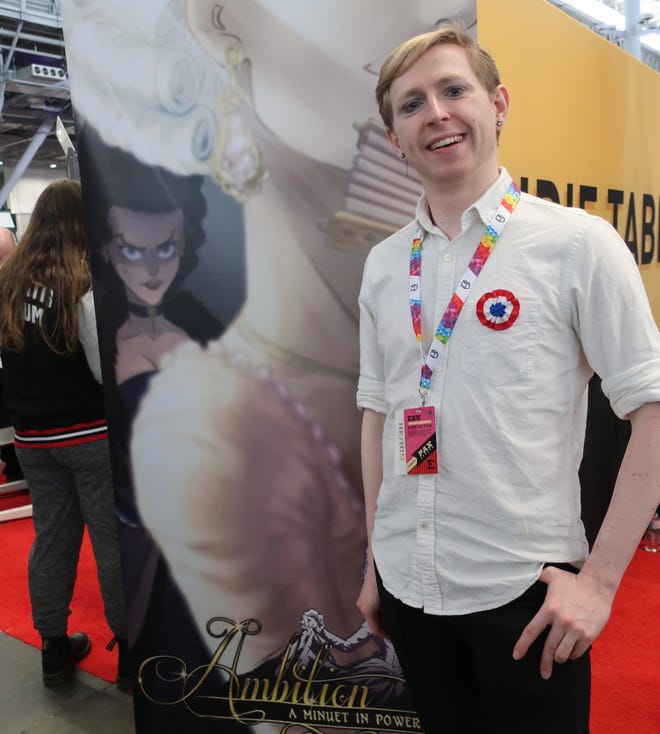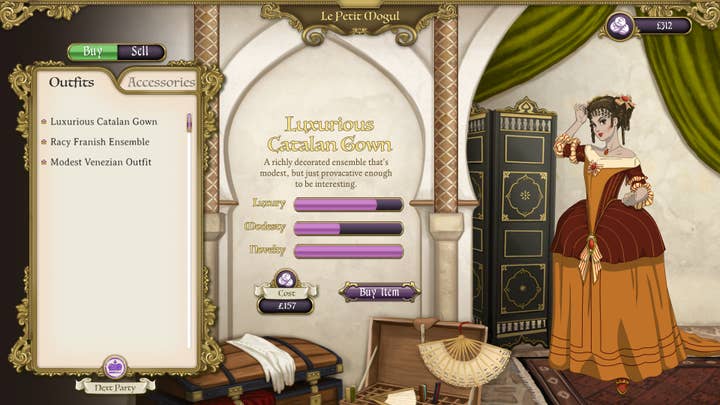Ambition: A Minuet in Power's extravagant aspirations
Joy Manufacturing Co's Luther Patenge on the motivations and challenges behind making games for underserved audiences
At the PAX East booth for Joy Manufacturing Co's Ambition: A Minuet in Power, developer Luther Patenge is impossible to miss. He's wearing an enormous, light blue gown in a style he defines as "Rococo Lolita," complete with a tall white wig.
Patenge's attire isn't just head-turning -- it's entirely appropriate to his studio's game about a "woman of fashion" living in pre-Revolutionary France. When her fiancé goes missing, protagonist Yvette must learn to navigate society, advance her position, and remain safe during a time of political upheaval -- all while staying fashionable and potentially wooing one of six eligible new suitors.
Ambition came about when Patenge, along with fellow developers Michael Seltzer and Alexandria Kairis, left their positions at mobile company Kabam in search of personal career satisfaction. Patenge had been working on a prototype of Ambition as a way to teach himself Unity, and showed up one night at the group's regular Dungeons & Dragons game with what he had so far -- at the time, "blue squares seducing white squares."
"When you're with a small team, any delay magnifies massively -- if one person gets sick, an entire division is functionally shut down"
But the others felt it had promise. In 2016, they launched a successful Kickstarter campaign with plans for a 2018 launch. When the team eventually ran out of runway, they were picked up by Humble to get the support they needed to finish it off.
"We needed more room to iterate on some of the core design elements than we thought, and unfortunately, iteration with a small team takes more time than you would hope, because you have less hands to work on everything," Patenge says. "But also, when you're with a small team, any delay magnifies massively -- because if one person gets sick, an entire division is functionally shut down. That gets in the way. It's the nastiness of games. Everything takes so much longer than you would hope.
"We joke that we have already performed so many miracles to get to this point. Having a successful Kickstarter campaign is a miracle. Getting a publisher is a miracle. All these things are miracles -- what's a few more, to get this thing done?"

Patenge partly attributes the publishing deal with Humble to the game's successful Kickstarter. Going through that process gave them the resources to advance the demo far beyond what it was initially, and also gave them the ability to prove to Humble there was already an audience for the product -- something that's especially important in the more niche genres of dating, simulation, and period drama.
And though Ambition has effectively been delayed two years past its intended release at this point -- and doesn't currently have a release window, though there is a free demo on Steam available now -- Patenge is firmly of the belief that both the time and extra money were absolutely necessary to make something good.
"Funding makes all things easier, and funding makes all things harder," Patenge says. "The additional resources gave us more wiggle room. There's this whole adage about how competition and difficulty make good art, and I don't know if I completely agree with that. I think people need room to experiment. They need room to fail. Otherwise they will never manage to reach that art's full fruition. They'll just go, 'What is the bare minimum thing that works?' And we're doing something in the rococo art period. This is not a time of 'less is more.' This is time of 'more is more.'"
"I think people need room to experiment. They need room to fail"
A major part of Patenge's pitch for Ambition is that it's a game for underserved audiences. Not only do you play as a woman working to gain power from a situation of initial disadvantage, but there are also multiple queer romance options available. Of the six date-able characters, two are women, and three are actual historical figures: aristocratic painter Elisabeth Vigee Le Brun, French general Thomas-Alexandre Dumas, and Jacobin leader Louis Antoine De Saint-Just.
"Looking around at this very expo hall, [women are] not the market that is being catered to in games right now," Patenge says. "We're talking about half of the human population. Do you think they don't like games? They don't like stories? That's preposterous. I wanted to tell a story about a person...who has very little and does a lot.
"She does not have hard power, especially because of the mores of her time period. She has soft power, and she's very intelligent, and I think that is a story that a lot of people can identify with. You're dealing with so many people who are so much heavier hitters than yourself simply because they've been given more opportunities than yourself, and you're just going to make anything work, goddamnit.

"...And talking about underserved audiences, there is a significant queer community in games, and I find they're often getting left out in the cold. I'm glad to see things are changing, and I'd like to be on the side of that change."
Patenge is also candid about the fact that it's easy to draw parallels between his game and elements of the current social moment -- another factor that might draw certain audiences to the game. Ambition, he says, is a game about a woman leveraging what little power she has to gain more power and security in a world that is fundamentally unfair and stacked against her. And it takes place in a period of dramatic civil unrest due to growing disparities between rich and poor.
"All art is political. Even if you leave things out, what you choose to leave out is a political statement"
"All art is political," Patenge says. "You cannot do it otherwise. Even if you leave things out, what you choose to leave out is a political statement, even if it's unintentional. It is hard not to draw parallels [between the French Revolution and the current political moment]. You can have people living like shit, and you can have gross inequality, but you cannot have both at the same time or something terrible happens. There's only so long that people can be stripping the bark off of trees and boiling it during a famine and looking at someone in a gilded palace. Eventually, something's gotta give."
Though Patenge is passionate about his goals for the game, he's also realistic about the fact that a game like Ambition might run up against challenges that games in more mainstream genres don't face. He mentions having reached out to other publishers first and being rejected simply due to its aesthetic not matching what the publisher typically supports -- which is fine and normal, he says. But that can happen even more often if your game is additionally targeting an audience perceived as more niche.
"I think a lot of it is about picking and choosing your battles," Patenge says. "If you do reach out to underserved audiences, certain avenues will be closed off to you, because they are looking for teams specialized in something [particular] and you are not it. You may have to blaze your own trail. But I think that the rewards are significant. When I look back [at the demo stations] I will sometimes see that every chair is filled by a woman. That means we're doing something right."
And Patenge adds that more avenues are opening up for such games, especially in the indie publishing space. He specifically points across the row of booths to the demo station for The Red Lantern -- a narrative game about dog sledding -- point out that as exciting and interesting as the concept is, such a game might not have gotten picked up a few years ago.
"One of the nice things about daring to do something different is that you stand out from the field," he continues. "People see our game and they see our baroque and rococo aesthetics, and people are drawn to it because there is value in being different. And when you reach out to underserved audiences and get a fan, you really get a fan. Those people recognize that you reached out to them, and there is a certain reciprocity you see in their interactions. It's not a thing you should expect, but it's very motivating.
"A lot more groups are playing footsie with games [for women and queer individuals], so to speak, and I hope that a bunch of developers see this as their time to take the plunge. And even if they don't, we'll be there."

